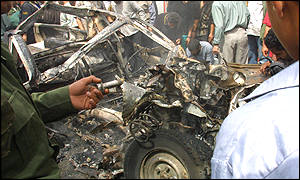| CATEGORIES | TV | RADIO | COMMUNICATE | WHERE I LIVE | INDEX | SEARCH | |||||||
|
| You are in: World: Middle East | ||||||||||||||||||||||||||||||||||||||||||||||||||||||||||||||||||||||||||||||||||||||||||||||||||||||||||||||||||||||||||||||||||||||||||||||||||||||||||||||||||||||||||||||||||||||||||||||||||||||||||||||||
|
Wednesday, 1 August, 2001, 21:01 GMT 22:01 UK
Israel's 'assassination policy'

Remains of a car hit by an Israeli rocket
By BBC News Online's Tarik Kafala
The Israeli Government of Ariel Sharon is, like its predecessors, committed to the policy of assassinating individuals who it believes pose a threat to its citizens.
Israeli officials have at times boldly admitted that the policy exists and is being pursued vigorously. "I can tell you unequivocally what the policy is," former deputy defence minister and current transport minister Ephraim Sneh said earlier this year. "If anyone has committed or is planning to carry out terrorist attacks, he has to be hit. It is effective, precise, and just." Recently officials have indicated that the Israeli army is being given a freer hand to carry out targeted killings of Palestinian activists. The policy has come in for criticism domestically and internationally. Human rights organisation Amnesty International has called the assassinations extra judicial killings. The policy has even been challenged in the Israeli high court. Long tradition Israel has a long history of assassination operations targeting individuals.
In 1997, one special operation went humiliatingly wrong. Two Israeli agents were arrested in Jordan following an attempt to poison a leading member of Hamas. Israeli military officials made it official policy in early November 1999, describing the plan as "initiated attacks" to stop members of Yasser Arafat's Fatah militia, known as Tanzim, from firing on Jewish settlers in the West Bank and Gaza. Friends become enemies Israel has always claimed the right to selectively assassinate its enemies. But the current strategy also targets its former partners in the peace process, who once co-operated with the Israeli security services in arresting Hamas and Islamic Jihad bombers.
Massoud Ayad, one of Mr Arafat's bodyguards, was assassinated in February. At the beginning of April, an Israeli helicopter gunship fired on a car in the Gaza Strip, killing a member of the militant Islamic Jihad group, Mohammed Abdel Al. Israeli opposition The Israeli left has argued that the assassination policy is gangster behaviour unbecoming of a government and against Israeli law. Those opposing the policy say that many of those assassinated could have just as easily been arrested and tried. Israel's high court in February heard an appeal against the policy of assassination, bought by Siham, the widow of Thabet Thabet. The court is yet to deliver a clear ruling, but the policy continues. Amnesty International in February harshly condemned the policy. "The use of state assassinations by Israel against Palestinian suspects is undermining the rule of law and fuelling the cycle of violence in the region," an Amnesty report said.
|
See also:
21 Feb 01 | Middle East
09 Jan 01 | Middle East
10 Nov 00 | Middle East
Internet links:
The BBC is not responsible for the content of external internet sites Top Middle East stories now:
Links to more Middle East stories are at the foot of the page.
|
||||||||||||||||||||||||||||||||||||||||||||||||||||||||||||||||||||||||||||||||||||||||||||||||||||||||||||||||||||||||||||||||||||||||||||||||||||||||||||||||||||||||||||||||||||||||||||||||||||||||||||||
|
Links to more Middle East stories |
 |
|
|||
| ----------------------------------------------------------------------------------
To BBC Sport>> | To BBC Weather>> | To BBC World Service>> ---------------------------------------------------------------------------------- © MMIII | News Sources | Privacy |